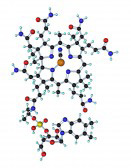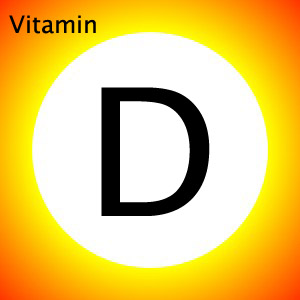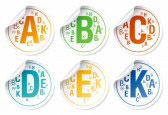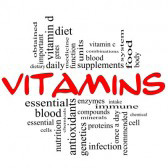Vitamin A
Vitamin A, also known as retinol is a fat soluble vitamin which produces the pigments in the retina of the eyes. As a fat soluble vitamin it can be stored in the body and if taken as a supplement should be taken with food as it needs the fat from the food to be assimilated in the body.
Vitamin A’s primary function is in helping with vision, especially in dim light and at night. It also helps with the strengthening of the immune system against infections, keeping the skin and linings of the body, such as the nose, healthy. It also has a beneficial effect on the prostate gland. Vitamin A should not be taken if you are pregnant or thinking of having a baby as an excess amount of vitamin A can harm the unborn child.
Good sources of vitamin A, are, eggs, cheese, oily fish, milk, yoghurt and liver. Most of these sources are high in saturated fat and cholesterol.
Vitamin B
 Vitamin B is not a single vitamin but a complex of eight vitamins that co-exist in the same foods. Vitamin B is a water soluble vitamin which means that it does not have to be taken with food and it cannot be stored in the body, so it has to be replenished, like vitamin C.
Vitamin B is not a single vitamin but a complex of eight vitamins that co-exist in the same foods. Vitamin B is a water soluble vitamin which means that it does not have to be taken with food and it cannot be stored in the body, so it has to be replenished, like vitamin C.
Vitamin B is found mainly in whole unprocessed foods and in such foods as bananas, potatoes, lentils, chilli peppers, beans, whole grains and molasses. It is also found in meat, turkey and tuna. Vitamin B12 is not available from plants and therefore vegans may suffer from a deficiency unless they take a supplement. The elderly and athletes may need to supplement due to poor absorption by these two groups. Vitamin B may also benefit those suffering from diabetes, both type 1 and 2.
B vitamins are necessary to support and increase the rate of metabolism, maintain healthy skin, hair and muscle tone, enhance the immune and nervous systems, promote cell growth and division and help prevent anaemia, reduce the risk of pancreatic cancer and may also help with attention deficit hyperactivity disorder (ADHD).
Vitamin C
Also known as ascorbic acid Vitamin C is an essential nutrient for humans for normal growth and development. Ascorbic acid is widely used as a food additive to prevent oxidation (see antioxidants). Vitamin C is a water soluble vitamin, like vitamin B and needs to be taken regularly since it cannot be stored in the body.
Vitamin C is a very powerful antioxidant and not only helps with the repair of cartilage, bones and gums but with the healing of wounds and the formation of scar tissue. It also forms an important protein which is used to make skin, tendons, ligaments and blood vessels. Too little vitamin C in the system can give rise to anaemia, bleeding gums, swollen and painful joints, easy bruising, rough, dry or scaly skin and in extreme cases scurvy.
Good sources of vitamin C are kiwi fruits, citrus fruits, green and red peppers, mangoes and pineapples and guavas, the skin of which contains about 5 times more vitamin C than an orange.
Remember that heat destroys vitamin C so eat your red peppers as near to raw as possible and put your health in the black.
Vitamin D
 Vitamins are a group of chemicals that are needed by the body for good health and are derived from the food you eat. Vitamin D, although referred to as a vitamin is a
Vitamins are a group of chemicals that are needed by the body for good health and are derived from the food you eat. Vitamin D, although referred to as a vitamin is a
steroid hormone and not exactly a vitamin in the strictest sense of the word. It is a fat soluble hormone (dissolves in fat instead of water), which also means that it can be stored in the body, unlike vitamins C and the B complex of vitamins which are water soluble and have to be taken regularly, as they cannot be stored in the body. Vitamin D is mostly made in the skin, through exposure to sunlight, hence the term “The sunshine vitamin.” Most foods contain very little vitamin D although some are now being fortified with it, such as cereals, milk, margarine and yoghurt. Natural foods that do contain some vitamin D are oily fish (sardines, salmon, mackerel, trout, tuna, shrimps, pilchards and herring), liver, egg yolk, mushrooms, cheese, milk and butter.
Lack of vitamin D is very common especially in people who live north of 35degrees latitude which includes most of North America, Europe and Russia. UVB (ultra violet B) rays from sunlight convert cholesterol (yes cholesterol) into vitamin D. The sunlight has to fall directly on to the bare skin. UVB rays cannot penetrate glass, so if you sit in a conservatory for instance and the sun is beating down, all you get is warmth not UVB rays. For people of white or very light complexion a 20 minute exposure 2/3 times per week in the summer months, April to September and between the hours of 10.00am and 3.00 pm when the sun is at its hottest is sufficient for the year. For those who have darker complexions a 40 minute to one hour exposure is needed, as melanin, which gives the dark complexion acts as a natural sunscreen, therefore a longer period of exposure is required. Tanning and supplementation are other ways of getting your required level of vitamin D.
Vitamin D is converted in the liver to calcidiol and it is this that is used to measure your vitamin D status. Some of the calcidiol is sent by way of the blood to the kidneys where it is converted to calcitriol, which is used by the body to strengthen bones. Most of the research has been carried out in recent years and apparently new, positive and exciting discoveries are being made regularly. Studies have linked vitamin D deficiency to various cancers, diabetes, heart disease, lupus, multiple sclerosis, osteoporosis, parkinson’s disease, alzheimer’s, arthritis, liver and kidney disease, psoriasis and prostate cancer and even depression in the dark winter months. More recently one report stated that a lack of vitamin D in black men was the contributory factor in prostate cancer becoming aggressive.
The connection between lack of vitamin D and rickets in children is well documented. A recent survey has found that the number of reported cases of rickets in the UK has risen in recent years. This has been attributed to the fact that many children spend most of their time indoors, usually on computers or game stations and when they do go outside their arms and legs are covered up. A study by a leading American hospital showed a correlation between type 2diabetes and a lack of vitamin D. Apparently, those whose type 2 diabetes was worse had a lower level of vitamin D. This relationship between low vitamin D levels and diabetes was even worse in “people of colour” than in whites. Despite the above mentioned correlation, the hospital has stated, however, that the public should not jump to conclusions. Another hospital, in Holland this time, has reported similar results.
Vitamin D supplements are available in tablet, drops and spray forms. It is highly recommended that you use drops (two drops each morning on your tongue) or a spray into your mouth, as these are more effective in delivering the daily requirements than tablets, which take longer to break down in your system. It is also advisable to take vitamin D3 as opposed to D2 as the former is more natural and the latter synthetic and less effective. New reports are suggesting that there is no evidence of this. Research also shows that those with a low level of vitamin D also suffered from arterial stiffness, which is a major risk factor for heart disease and strokes.
Current scientific research suggests that all the cells in your body have vitamin D receptors and consequently need vitamin D for their well being. This latest research also suggests that vitamin D is also responsible for the regulation of over two thousand genes in your body and plays a major role in:
Cell formation and cell longevity
Skin and pancreatic health
Heart health
Aging process
Sleep patterns
Hearing and eye health
Respiratory and reproductive health
Weight management including the metabolism of fats and carbohydrates
Strong healthy bones, because it helps with calcium uptake
Hair, muscles
Immune system
Proper food digestion
Studies have shown that if everyone had optimal levels of vitamin D, the rate of cancer would drop by as much as 70% almost immediately. These said studies also show that rates of cancer have a correlation with the amount of sun exposure people get. Apparently people who live away from the equator have a higher incidence of common cancers than those who live nearer the equator and this is consistent across different cultures and economic levels.
As you get older your skin becomes thinner and as a consequence absorbs less ultra violet rays (UVB). Long trousers and long sleeved shirts and blouses and staying indoors during summer also inhibit the intake of UVB rays. So, if you live above 35 degrees north latitude, if you are fat, getting on in years and dark skinned then you should pay particular attention to your vitamin D level. When taking a supplement, however, it is impossible to recommend a standard dose, as people come in all colours, sizes and ages, but two drops of vitamin D3 daily or one spray should be sufficient from April to September, to see you through the year.
A reading above 60nmo/L is considered adequate when measuring your vitamin D level. If your level is below 32nmo/L you have a serious deficiency. The test is normally referred to as a 25 Hydroxyvitamin D test, shortened to 25 Hydroxy.
Symptoms of vitamin D deficiency are usually general aches and pains and sometimes this deficiency is misdiagnosed as fibromyalgia as the symptoms are similar. A chronic deficiency cannot be reversed overnight and it takes months of sunlight and supplementation to rebuild the body’s bones and nervous system.
Considering the importance of vitamin D and the role it plays in your well being you should have the 25 Hydroxy D test carried out on your next visit to your doctor.
Vitamin E
Vitamin E is a powerful antioxidant which gives a significant boost to the immune system. It is not a single vitamin but forms part of a compound of 8 vitamins. Vitamin E helps with male infertility problems, skin conditions, arthritis, aging, prostate conditions, heart disease, Parkinson’s disease and alzheimer’s disease. A deficiency can cause retinopathy, peripheral neuropathy and impairment of the immune system
Food sources of vitamin E are almonds, avocados, brazil nuts, broccoli and cod liver oil.
Vitamin K
Vitamin K consists of two vitamins K1 and K2 both of which are fat soluble, meaning that they can be stored in the body and should be taken with food. Vitamin K1 is derived from plants and K2 is produced by bacteria in the large intestines. Long term use of antibiotics could reduce the amount of vitamin K in your body. Vitamin K is involved in maintaining good bone health as you age and a deficiency can lead to osteoporosis, coronary heart disease, anaemia, bleeding gums and nose bleeds.
Vitamin K1 is found in avocados, parsley, cruciferous vegetables (greens) and kiwi fruit. Vitamin K2 is found in meat, eggs and natto (a fermented Japanese soy product).
“Put Your Health In The Black”



